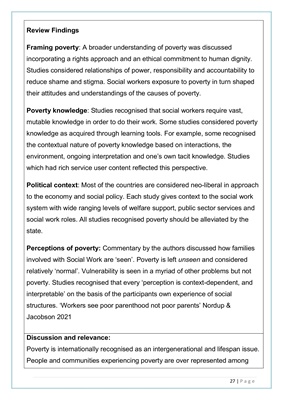
27 | P a g e
Review Findings
Framing poverty: A broader understanding of poverty was discussed
incorporating a rights approach and an ethical commitment to human dignity.
Studies considered relationships of power, responsibility and accountability to
reduce shame and stigma. Social workers exposure to poverty in turn shaped
their attitudes and understandings of the causes of poverty.
Poverty knowledge: Studies recognised that social workers require vast,
mutable knowledge in order to do their work. Some studies considered poverty
knowledge as acquired through learning tools. For example, some recognised
the contextual nature of poverty knowledge based on interactions, the
environment, ongoing interpretation and one's own tacit knowledge. Studies
which had rich service user content reflected this perspective.
Political context: Most of the countries are considered neo-liberal in approach
to the economy and social policy. Each study gives context to the social work
system with wide ranging levels of welfare support, public sector services and
social work roles. All studies recognised poverty should be alleviated by the
state.
Perceptions of poverty: Commentary by the authors discussed how families
involved with Social Work are 'seen'. Poverty is left unseen and considered
relatively 'normal'. Vulnerability is seen in a myriad of other problems but not
poverty. Studies recognised that every 'perception is context-dependent, and
interpretable' on the basis of the participants own experience of social
structures. 'Workers see poor parenthood not poor parents' Nordup &
Jacobson 2021
Discussion and relevance:
Poverty is internationally recognised as an intergenerational and lifespan issue.
People and communities experiencing poverty are over represented among